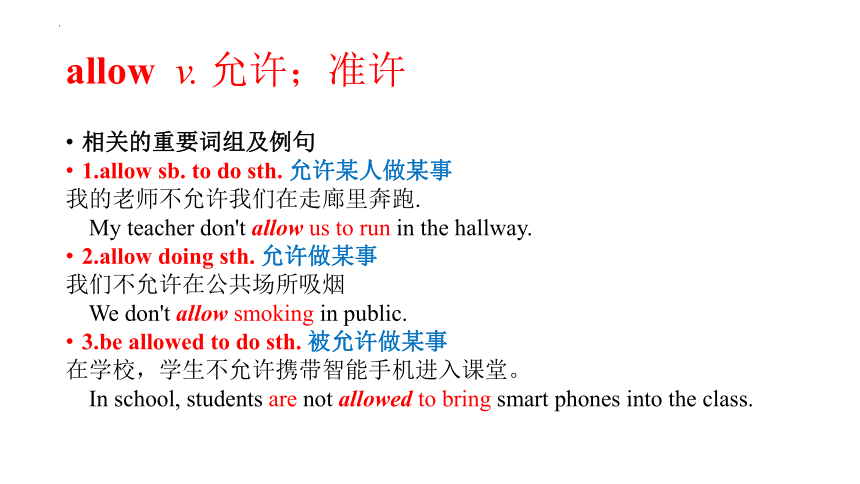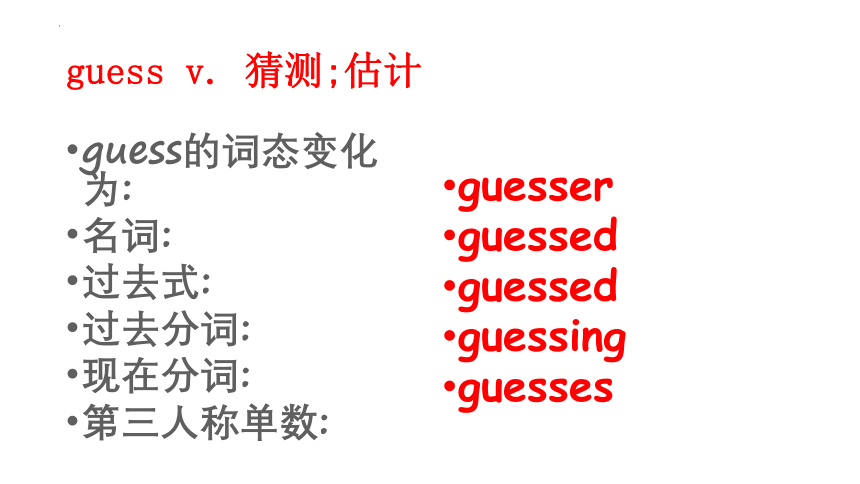人教新目标(Go for it)版八年级下Unit 4 Why don't you talk to your parents? SectionA词汇讲解课件(19张PPT)
文档属性
| 名称 | 人教新目标(Go for it)版八年级下Unit 4 Why don't you talk to your parents? SectionA词汇讲解课件(19张PPT) |  | |
| 格式 | zip | ||
| 文件大小 | 231.1KB | ||
| 资源类型 | 教案 | ||
| 版本资源 | 人教新目标(Go for it)版 | ||
| 科目 | 英语 | ||
| 更新时间 | 2022-03-06 13:23:53 | ||
图片预览







文档简介
(共19张PPT)
人教版英语八年级下册Unit 4 Section A词汇讲解
By Tom
allow v. 允许;准许
相关的重要词组及例句
1.allow sb. to do sth. 允许某人做某事
我的老师不允许我们在走廊里奔跑.
My teacher don't allow us to run in the hallway.
2.allow doing sth. 允许做某事
我们不允许在公共场所吸烟
We don't allow smoking in public.
3.be allowed to do sth. 被允许做某事
在学校,学生不允许携带智能手机进入课堂。
In school, students are not allowed to bring smart phones into the class.
wrong adj. 有毛病;错误的
wrong作形容词,意为“有毛病的”。
There is nothing wrong with him.
(2) wrong作形容词,还可意为“错误的”,
此时其反义词为right“正确的”。
Sorry, I copied the wrong number.
What's wrong 怎么了?
该句可以单独使用,也可以与with连用。
“What's wrong (with...) ”常用于以下几种情况 :
(1) 用于询问对方有什么问题或有什么不顺心的事,
意为“(……)怎么了?”或“(……)出什么事了?”。
—What's wrong with Tom
—He lost his books on his way home.
(2) 用于医生询问患者的病情,意为“(……)怎么了?”或“(……)哪里不舒服 ”。
—What's wrong with you
—I have a cold.
(3) 用于询问某物出了什么毛病或故障,意为“(……)出什么毛病了?”。同义句:Is there anyting wrong with sth.
—What's wrong with this phone
—It doesn't work.
guess v. 猜测;估计
guess的词态变化为:
名词:
过去式:
过去分词:
现在分词:
第三人称单数:
guesser
guessed
guessed
guessing
guesses
I guess
在美国口语中,I guess(一般现在时)常用以表示“认为,想”,
相当于I think或I suppose。
后面跟从句,语气较婉转,也可以用so或not来替代前面句中
肯定式或否定式的宾语。
Yes, I guess you're right.
是的,我想你是对的。
I guess so/not.
我想是的/不是
deal n. 协议;交易
1.a big deal 重要的事
Although she's wrong, it's not a big deal.
2.deal 协议
--Let’s meet at the school gate at six tomorrow morning .
--That’s a deal.那就这么定了.
work out 成功地发展;解决
Things will work out.
一切都会顺利的.
Don’t worry, I’m sure we can work it out.
别担心, 我保证我们会有办法解决的.
get on with 和睦相处;关系良好
get on with sb或者是
get on well with sb;
get along well with sb
和…友好相处
例如:She gets along well with her friend.
她和她的朋友相处融洽.
communication n. 交流;沟通municate
communicate with sb. =
have a communication with sb.
和某人交流/沟通
argue v. 争吵;争论
argue with sb.
与人争吵/争论
argue about/over sth.
就某事而争吵/争论
argue with sb. about sth.
为某事与某人争论
instead adv. 代替;反而;却
单独使用时位于句首或句末。
e.g. There’s no noodles. Would you like some rice instead
instead of 是介词短语,意为“代替……”,后面可跟名词、代词、介词短语、动词-ing形式等。
e.g. My father went to work by car instead of by bus.
e.g. Why don’t you play basketball instead of just
walking
whatever pron. 任何;每一
whatever意为“无论什么;不管什么”,
相当于no matter what,引导让步状语从句。
As far as we know, safety comes first whatever you do.
offer动词,意为“提供”。
1.offer to do sth. 主动提出做某事
The kids offered to do the dishes.
2.offer sth. to sb.=
offer sb. sth.
为某人提供某物
The factory has offered more jobs to the local people.
3.offer还可作名词,意为“提议;提供”。
Thanks for your offer of help.
explain v. 解释;说明
explanation n. 解释;说明
explain to sb. 向某人解释
You'd better go and explain to your father.
explain sth. to sb. 向某人解释某事
Could you explain the reason of fighting with your brother
sb. explains+宾语从句 某人解释说……
He explained that he was too careless.
ruturn v. 归还;回来;返回
1.ruturn相当于
give sth. back。
2.return sth. to sb. =
return sb. sth.,
意为“把某物还给某人”。
I'm going to return this book to Tom.
=I'm going to return Tom his book.
return还可用作不及物动词,意为“回来;返回”,
相当于come back。
return to+地点名词
return+地点副词
返回某地
THANKS
人教版英语八年级下册Unit 4 Section A词汇讲解
By Tom
allow v. 允许;准许
相关的重要词组及例句
1.allow sb. to do sth. 允许某人做某事
我的老师不允许我们在走廊里奔跑.
My teacher don't allow us to run in the hallway.
2.allow doing sth. 允许做某事
我们不允许在公共场所吸烟
We don't allow smoking in public.
3.be allowed to do sth. 被允许做某事
在学校,学生不允许携带智能手机进入课堂。
In school, students are not allowed to bring smart phones into the class.
wrong adj. 有毛病;错误的
wrong作形容词,意为“有毛病的”。
There is nothing wrong with him.
(2) wrong作形容词,还可意为“错误的”,
此时其反义词为right“正确的”。
Sorry, I copied the wrong number.
What's wrong 怎么了?
该句可以单独使用,也可以与with连用。
“What's wrong (with...) ”常用于以下几种情况 :
(1) 用于询问对方有什么问题或有什么不顺心的事,
意为“(……)怎么了?”或“(……)出什么事了?”。
—What's wrong with Tom
—He lost his books on his way home.
(2) 用于医生询问患者的病情,意为“(……)怎么了?”或“(……)哪里不舒服 ”。
—What's wrong with you
—I have a cold.
(3) 用于询问某物出了什么毛病或故障,意为“(……)出什么毛病了?”。同义句:Is there anyting wrong with sth.
—What's wrong with this phone
—It doesn't work.
guess v. 猜测;估计
guess的词态变化为:
名词:
过去式:
过去分词:
现在分词:
第三人称单数:
guesser
guessed
guessed
guessing
guesses
I guess
在美国口语中,I guess(一般现在时)常用以表示“认为,想”,
相当于I think或I suppose。
后面跟从句,语气较婉转,也可以用so或not来替代前面句中
肯定式或否定式的宾语。
Yes, I guess you're right.
是的,我想你是对的。
I guess so/not.
我想是的/不是
deal n. 协议;交易
1.a big deal 重要的事
Although she's wrong, it's not a big deal.
2.deal 协议
--Let’s meet at the school gate at six tomorrow morning .
--That’s a deal.那就这么定了.
work out 成功地发展;解决
Things will work out.
一切都会顺利的.
Don’t worry, I’m sure we can work it out.
别担心, 我保证我们会有办法解决的.
get on with 和睦相处;关系良好
get on with sb或者是
get on well with sb;
get along well with sb
和…友好相处
例如:She gets along well with her friend.
她和她的朋友相处融洽.
communication n. 交流;沟通municate
communicate with sb. =
have a communication with sb.
和某人交流/沟通
argue v. 争吵;争论
argue with sb.
与人争吵/争论
argue about/over sth.
就某事而争吵/争论
argue with sb. about sth.
为某事与某人争论
instead adv. 代替;反而;却
单独使用时位于句首或句末。
e.g. There’s no noodles. Would you like some rice instead
instead of 是介词短语,意为“代替……”,后面可跟名词、代词、介词短语、动词-ing形式等。
e.g. My father went to work by car instead of by bus.
e.g. Why don’t you play basketball instead of just
walking
whatever pron. 任何;每一
whatever意为“无论什么;不管什么”,
相当于no matter what,引导让步状语从句。
As far as we know, safety comes first whatever you do.
offer动词,意为“提供”。
1.offer to do sth. 主动提出做某事
The kids offered to do the dishes.
2.offer sth. to sb.=
offer sb. sth.
为某人提供某物
The factory has offered more jobs to the local people.
3.offer还可作名词,意为“提议;提供”。
Thanks for your offer of help.
explain v. 解释;说明
explanation n. 解释;说明
explain to sb. 向某人解释
You'd better go and explain to your father.
explain sth. to sb. 向某人解释某事
Could you explain the reason of fighting with your brother
sb. explains+宾语从句 某人解释说……
He explained that he was too careless.
ruturn v. 归还;回来;返回
1.ruturn相当于
give sth. back。
2.return sth. to sb. =
return sb. sth.,
意为“把某物还给某人”。
I'm going to return this book to Tom.
=I'm going to return Tom his book.
return还可用作不及物动词,意为“回来;返回”,
相当于come back。
return to+地点名词
return+地点副词
返回某地
THANKS
同课章节目录
- Unit 1 What's the matter?
- Section A
- Section B
- Unit 2 I'll help to clean up the city parks.
- Section A
- Section B
- Unit 3 Could you please clean your room?
- Section A
- Section B
- Unit 4 Why don't you talk to your parents?
- Section A
- Section B
- Unit 5 What were you doing when the rainstorm came
- Section A
- Section B
- Review of Units 1-5
- Unit 6 An old man tried to move the mountains.
- Section A
- Section B
- Unit 7 What's the highest mountain in the world?
- Section A
- Section B
- Unit 8 Have you read Treasure Island yet?
- Section A
- Section B
- Unit 9 Have you ever been to a museum?
- Section A
- Section B
- Unit 10 I've had this bike for three years.
- Section A
- Section B
